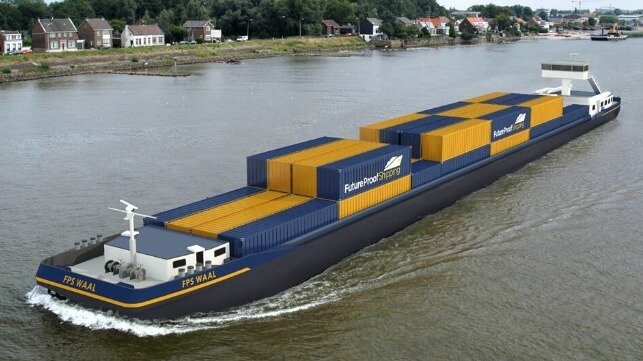Future Proof Shipping, a Dutch company dedicated to expanding the use of zero-emission shipping, is working to launch its second hydrogen-fueled inland container vessel. To support the project, which represents a further advancement in hydrogen technologies, the startup company will be joining with the European innovation project Flagships, a consortium of 12 European partners which also aims to raise the readiness of zero-emission waterborne transport.
Over the coming months, Future Proof Shipping (FPS) reports it will work closely with fuel cell technology experts Ballard Europe, ship design company LMG Marin, and project coordinators VTT to reach its goal of launching the FPS Waal by the summer of 2023 as its second hydrogen-powered zero-emission ship. The company is currently converting its first vessel, the 360-foot inland container barge FPS Maas, to operate on hydrogen. They expect the first vessel to enter service by the third quarter of 2022 on the Rhine.
“The demand for more sustainable technologies in inland waterway transport is on the rise,” says Jyrki Mikkola, Flagships Project Coordinator at the VTT Technical Research Centre of Finland. “With FPS joining us, we have two groundbreaking vessels part of the Flagships project. We aim to raise the readiness of zero-emission waterborne transport in Europe.”
FPS acquired two additional barges, including the FPS Waal, in the fall of 2021 targeting both of them for conversion to hydrogen operations. The company reports that the power capacity, size, and design of the propulsion system for the FPS Waal will need to be optimized to handle the higher energy consumption rates on the Rotterdam to Duisburg section of the Rhine. Together, with the partners in the Flagships project, they will collaborate across a broad range of activities to complete the engineering, fuel cell provision, and safety studies required for the vessel’s approval, by applying and further developing the existing regulatory guidelines.
“We are deploying our second zero-emissions vessel here to help decarbonize this busy stretch of 240 kilometer inland waterway,” said Richard Klatten, CEO of Future Proof Shipping. “This route is longer and has significantly higher and varying power demands than the route for the FPS Maas, pushing this project team to elevate their innovation efforts considerably. These are new challenges that we are ready to take on together with the Flagships team to blaze a new trail towards zero-emissions inland shipping for all.”
Similar to the FPS Maas, Future Proof Shipping aims to retrofit the FPS Waal, a 360-foot-long barge, to sail 100 percent emission-free. During the retrofit, the internal combustion engine will be removed, and the new zero-emissions propulsion system including PEM fuel cells, hydrogen storage, battery packs, and an electric drive train will be installed. The total amount of power installed will be around 1200 kW and the vessel will have a cargo capacity of 200 TEU after the retrofit.
Future Proof Shipping reports that it has already been in discussions with several cargo owners interested in shipping their containers without emissions on this route and who are aiming to move a large part of their sea cargo to inland water transportation.
“Inland waterways are important for freight transport in Europe and therefore I am pleased to see a high-power container vessel being converted to zero-emission,” said Bart Biebuyck, Executive Director of the Clean Hydrogen Partnership. “The FPS Waal conversion will bring knowledge on how to retrofit vessels from diesel combustion to zero-emission alternatives by using a battery in combination with green hydrogen in a fuel cell. A key aspect is the replicability of this zero-emission retrofit to similar vessels.”
FPS aims to build and operate a fleet of 10 zero-emission inland and short-sea vessels over the next five years which they will offer for charter to logistics service providers and cargo owners. FPS will also facilitate other shipowners and stakeholders in the maritime sector who are ready to make the shift to zero emissions, through technical support as well as project development and management.
The Flagships project has received funding from the Fuel Cells and Hydrogen 2 Joint Undertaking, which receives support from the European Union’s Horizon 2020 Research and Innovation program, Hydrogen Europe, and Hydrogen Europe Research.
Source: The Maritime Executive






